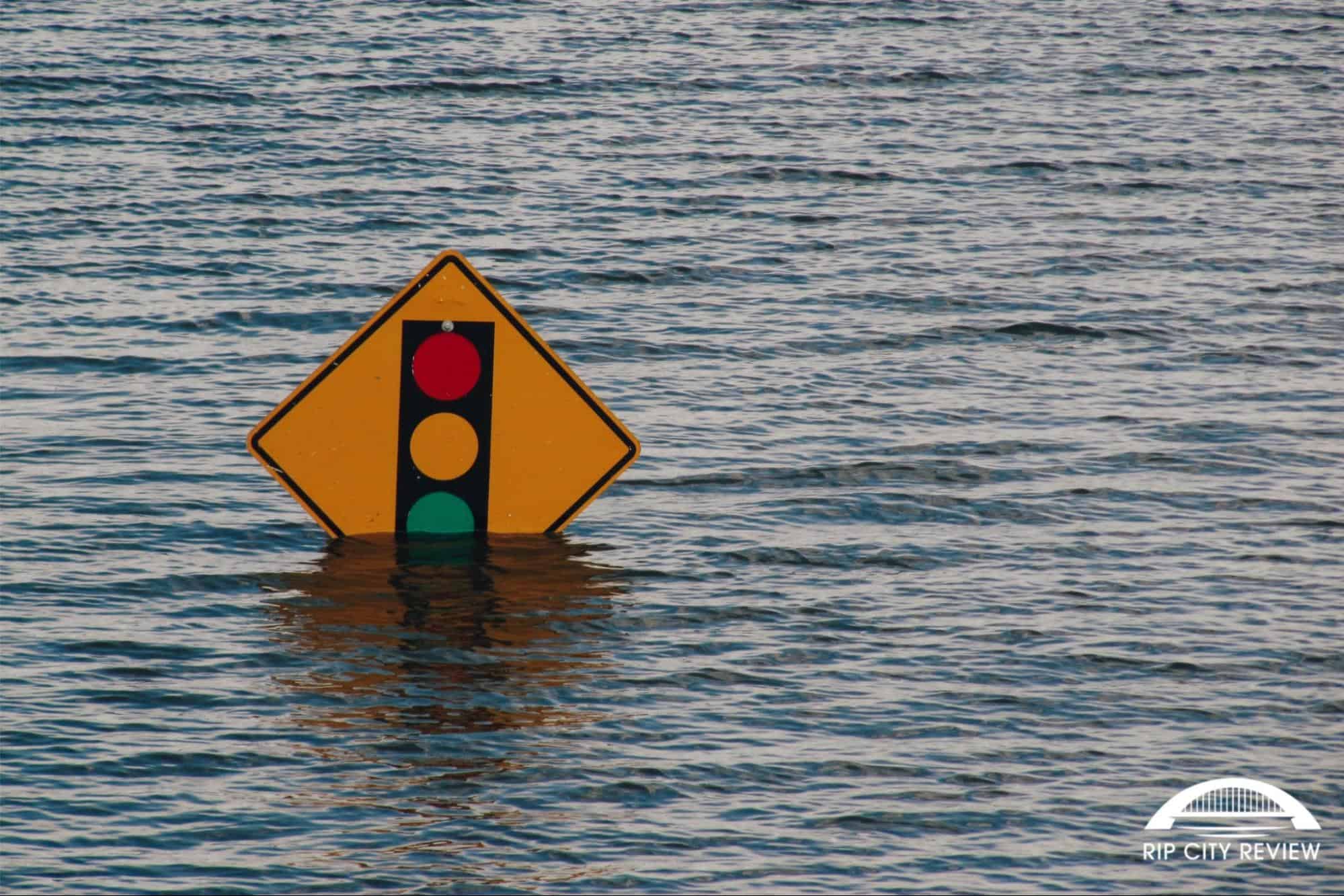Categories > Guides and Tips

Will Portland be underwater?
Portland is in danger of going underwater but not in the immediate future. Oregonians, especially those in the towns of Warrenton, Coos Bay, Lincoln City, Astoria, and Reedsport, risk losing their homes by 2100.
With climate change’s effects becoming more potent and with unpredictable weather phenomena being a regular occurrence, the question of whether Portland will be underwater is a growing concern for many.
We understand how this can be worrying especially if you’re thinking about moving to Portland, so we’ll try to answer the question for you.
Portland will go underwater after Western Oregon

Portland may not be a coastal city, but Western Oregon directly faces the open water of the Pacific Ocean. Thus, in the case that Portland will go underwater, it will happen after Western Oregon does.
Western Oregon’s geography makes it extremely vulnerable to unpredictable and severe weather conditions, such as flooding and storm surges.
This directly puts people’s lives and safety at risk. Not only can it mean loss of lives and property, but damaged ecosystems and destroyed habitats will also result in a shortage of food supply.
According to real-estate company Zillow, the following towns face the greatest risks of losing their homes by 2100:
| Warrenton | 829 homes |
| Coos Bay | 528 homes |
| Lincoln City | 523 homes |
| Astoria | 495 homes |
| Reedsport | 470 homes |
When will Portland be underwater?

- In the next 30 years, West Coast water levels are expected to rise 4 to 8 inches.
- Flooding is expected to get even worse by 2050.
- Scientists estimate it may take between 1,000–10,000 years for the majority of Oregon to go underwater.
There’s no definite date or year as to when Portland—or any other city in the world, for that matter—will go underwater, as climate change predictions and forecasts often change.
Science continues to evolve as we learn more about climate change and its effects. Furthermore, there may also be unforeseen conditions that lead to forecasts changing.
According to Surging Seas, these are the rates for projected sea level rise in Portland in medium and extreme scenarios:


Glaciers have already been melting at an alarming rate for the past 30 years, and should the melting speed up, cities around the world will go underwater earlier than expected.
The earlier statistic from Zillow estimated the loss of houses by 2100, but according to the National Oceanic and Atmospheric Administration (NOAA), a rise of 4 to 8 inches is expected for the West Coast in the next 30 years.
By 2050, the standards for flooding will have considerably changed. What we consider damaging floods now will be considered typical floods then, and that’s not yet including storm surges.
Urban planner and cartographer Jeffrey Linn has created a sea-rise level map of Oregon in the next 1,000 years when all the ice sheets have melted.
In this map, Portland will have a peninsula of its own, but other parts of the state such as Tualatin, Tigard, and Beaverton will already be underwater.
Experts have cast their doubts on Linn’s interpretation, with some raising the point that it will take 10,000 years before most of Oregon will be submerged.
However, what remains true is that if the glaciers continue to melt at their current rate and the effects of climate change won’t be mitigated, parts of Oregon will go underwater.
Why are sea levels rising?

- Sea levels are rising because of the continuous melting of the earth’s ice sheets.
- High levels of carbon emissions cause a rise in temperature, thus speeding up the rate at which ice sheets are melting.
Sea levels are rising primarily because of the rapid rate at which glaciers are melting. Glaciers are essential to the world’s climate, as they deflect sunlight, thus helping regulate the global temperature.
Glaciers and ice sheets are melting due to the high level of emissions in the atmosphere. High levels of carbon dioxide and greenhouse gas emissions cause a rise in temperature, thus slowly melting the glaciers.
Emission levels can cause a domino effect on our world’s climate: the higher the emission levels, the hotter the global temperature will be. This can mean a faster rate of ice melting, thus ending in higher sea levels across the globe.
Rising sea levels cause a whole slew of other environmental problems such as storm surges, coastal erosion, and river discharge, which can all contribute to flooding problems.
Another phenomenon that makes the sea level rise even worse is El Niño, which is when the water temperatures in the Pacific Ocean get warmer.
According to Sea Level Rise Org, water expands when it’s warmer, and during the El Niño period, coastal sea levels may be higher than the rest of the year despite the lack of rain during this season.
What can I do?

The best mitigating efforts you can do is to protect your home from the possible effects of flooding, which would entail constant maintenance and inspections.
The effects of climate change will only grow worse every year, and the prices of real estate will only continue to rise. Portland will quickly become a more expensive city to live in.
There are possible mitigation measures you can do, such as remodeling or renovating their homes to be flood-proof.
It will also be advantageous to regularly have your home inspected, especially for possible vulnerabilities in your home that can leave you at risk should flooding occur.
It’s also essential to have your plumbing lines checked, as it isn’t entirely impossible for your house to be flooded due to underground pipes bursting during flooding in the city.
This practice can also protect you from possible water contamination after flooding.
Can we stop Portland from going underwater?

Only if we’re able to mitigate the effects of global warming. Scientists estimate for most of Oregon to go underwater in thousands of years, but we can still delay this possibility by adopting more environmentally friendly habits and practices.
Unfortunately, most of the effects of climate change can’t be reversed, but that doesn’t mean everything is completely hopeless.
We can still mitigate its effects and continue to make our planet a habitable place, and this is done by slowing down and limiting the rate of our carbon emissions.
Glaciers take up tens to thousands of years to completely form, and there’s no way—at least currently—for us to form them overnight, but we can halt their melting.
While we may not be able to stop climate change, we can slow it down.
Slowing down the effects of climate change will allow us time to adjust our ways of living and for scientists to conduct further studies to prevent habitat loss for different organisms and species.
It may take the whole effort of our species to completely halt climate change, but we can still take our own individual measures.
Things You Can Do to Mitigate Climate Change
- Decrease dependence on gas-powered cars
One of the biggest changes we can make is by decreasing our dependence on gas-powered cars and instead opting for electrical vehicles, bicycles, or even taking public transportation.
- Opt for your home to be energized by solar power
If it’s feasible, you can also opt for your home to be energized by solar power, which is a renewable resource. Not only that, it will save you money from electricity bills in the long run!
- Decrease the use of single-use plastics
Another option you can take is by decreasing your use of single-use plastics, which can take centuries to biodegrade. These tend to fill up landfills and only contribute to carbon emissions.
- Reduce energy usage at home
Lastly, you can reduce your energy usage at home by unplugging devices when they’re not in use and by using more energy-efficient options such as LED light bulbs or choosing products that have been Energy Star-certified.
It may not seem like much, but every effort to decrease our carbon emissions can go a long way in curbing the effects of climate change. This is the only planet we have, after all.





